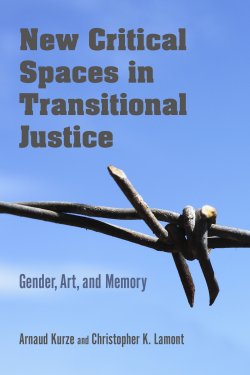COLLABORATIONS – Dealing with the Past Together: Exploring Questions of Gender, Art & Memory – by Arnaud Kurze
Posted in: Guest Essay

On Tuesday, October 22, at 11:30 a.m., in the Sprague Library “Quiet Room,” there will be a roundtable discussion on Gender, Art and Memory sponsored by RiGS | Research on Interdisciplinary & Global Studies, a Montclair State University Faculty Collaboration.
“In each epoch, memory reconstructs an image of the past that is in accord with the predominant thoughts of the society,” Maurice Halbwachs noted in his seminal work On Collective Memory. As a “pracademic,” a scholar that also engages in advocacy and policy work on practices and strategies focusing upon how to best overcome post-authoritarian and post-conflict violence, the question of how to create a shared and sustainable collective memory — as well as how societies and local communities perceive past atrocities and human rights violations — remains, for me, a very tough nut to crack.
Fortunately, when embarking on a journey to complete a project with the aim of tackling some of these challenging questions, I was able to lean on a number of incredibly sharp and thoughtful practitioners, scholars and activists who had alternative and innovative ways of approaching these difficult and complex issues.
While on our journey, myriad experiences helped create a rich and wholesome collection of narratives to share powerful insights not only with interested scholars, but also policymakers, practitioners and human rights advocates alike. These narratives draw from many lived experiences, including victim testimonies in post-conflict zones, interviews with youth activists in post-authoritarian countries and diplomatic nation-building in transition areas, such as Iraq, among others.
This adventure resulted in a provocative and diverse book, co-edited with Christopher K. Lamont.
New Critical Spaces in Transitional Justice: Gender, Art & Memory (Indiana University Press, 2019) prepares the ground for broader scholarly and public debates on topics, which, until now, unfortunately did not constitute predominant thoughts in society, as claimed by Halbwachs. Often times, collective memory processes are distorted and politicized, and the stories disseminated among communities paint a skewed picture of a conflict or a repressive regime. Helping unheard, silenced voices to emerge and enter centerstage is therefore crucial to help mitigate trauma in affected communities and societies.
Art, for instance, has not yet received the attention it deserves as a topic of conversation, particularly as it pertains to acting as a vector of social change when seeking remedies for political violence and repression. Notwithstanding, visual arts, performance activism and participatory engagements including artistic forms of expression are invaluable means of dealing with trauma and post-traumatic stress. Communities ranging from the Balkan region to South Africa have used various art forms to help victim communities raise their voices, be recognized and commemorate lost and loved ones. Activists in each of the above cases often have relied upon community-built art installations, such as sculptures, and have encouraged victims and community members to participate in advocacy-driven theatrical performances, fueling commemorative practices and furthering community-ties in formerly war-torn areas, and in the aftermath of autocratic regimes.
Moreover, gender-based violence — particularly violence against males and sexual minorities — still represent taboo topics in many societies that are grappling with the consequences of mass atrocities and conflict. Creating physical, virtual and conceptual spaces for victims and minorities who have suffered from such violence is an essential step in the right direction. The young engaged scholars in our book describe reaching out to individuals and distressed communities, passionately promoting a better understanding and collaborating to build better support structures and transnational networks for advocacy efforts to improve the lives of those who suffered in silence and who deserve to be heard and treated with dignity and respect.
Contributors to New Critical Spaces in Transitional Justice: Gender, Art & Memory all showed a phenomenal dedication to working toward a better future for victims and communities in need. In addition, they have manifested an incredible passion for their work in writing about lesser known issues. Educating the world we live in and the people we live with is an excellent example of a true vocation. This book could not have been done without the perseverance and collegiality that were the foundation of this multidisciplinary and international collaboration on collective memory processes. I am grateful to have been able to work with such a great team of colleagues to foster new epistemological theorems that provide innovative, forward-looking explanations of how our world works and how contemporary societies embrace social change.
I encourage colleagues to reach out and embark on a journey similar to the one I took many years ago and which I continue to pursue. As James Young, a scholar of memory studies, noted, collective memory is textured, in other words, memorials to commemorate the past also suppress parts of the past.
It is the responsibility of society to weave a narrative that embraces a holistic image and understanding of the violence and suffering endured by its victims.
Working together, we can create a more resilient and stronger social tissue in affected societies.
Arnaud Kurze is Assistant Professor of Justice Studies at Montclair State University. His scholarly work on transitional justice in the post-Arab Spring world focuses particularly on youth activism, art and collective memory. Dr. Kurze was appointed a Global Fellow at the Woodrow Wilson Center in Washington, DC, from 2016-2020, studying youth resilience in North Africa and the Middle East. He has published widely in academic journals, contributed to edited volumes and is author of several reports on foreign affairs for government and international organizations. He is the co-editor of the book, New Critical Spaces in Transitional Justice: Gender, Art & Memory (2019). He has also given interviews on the politics of collective memory in US society and beyond, LGBT issues in the Middle East and Tunisia’s democratization process, among others.
